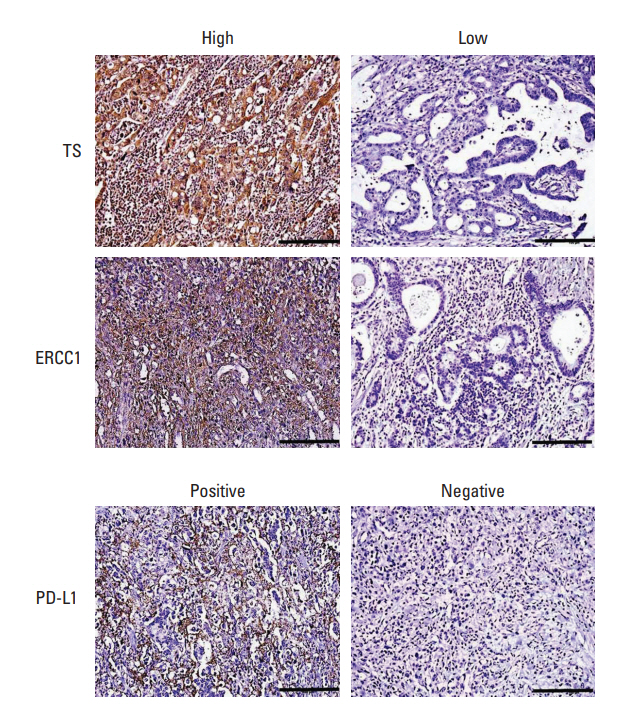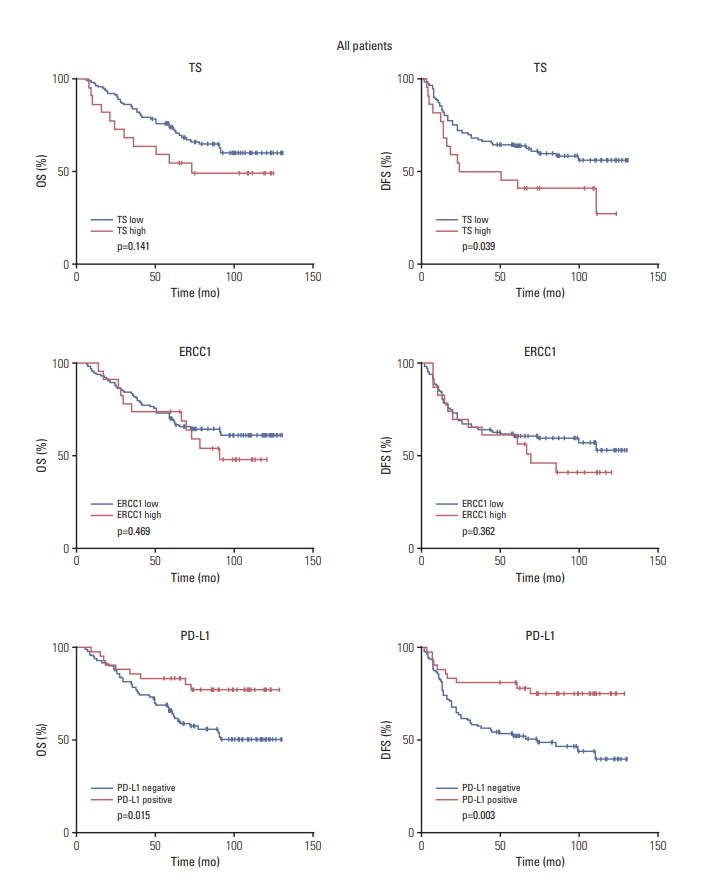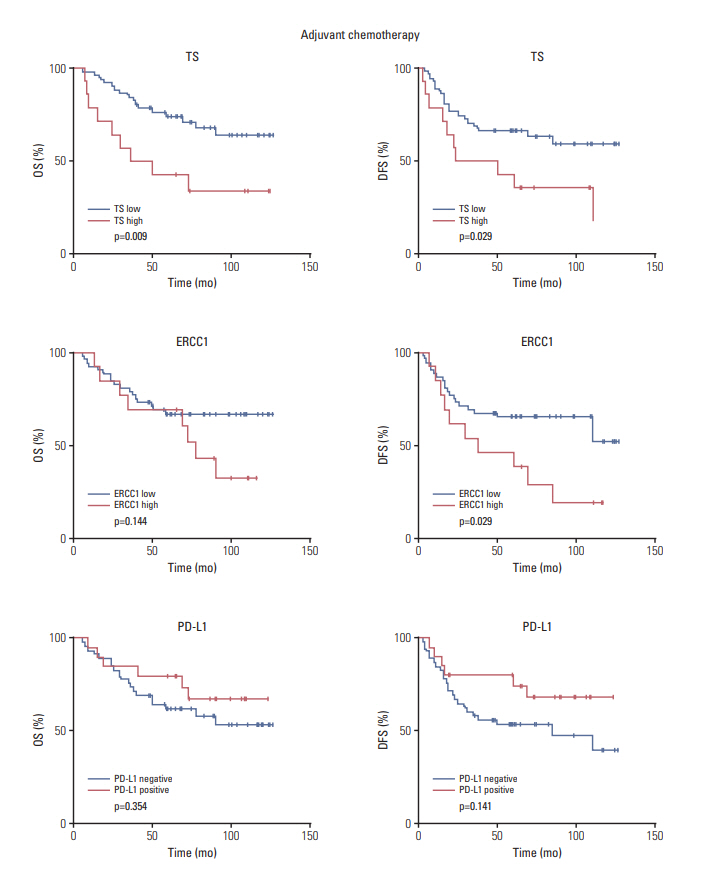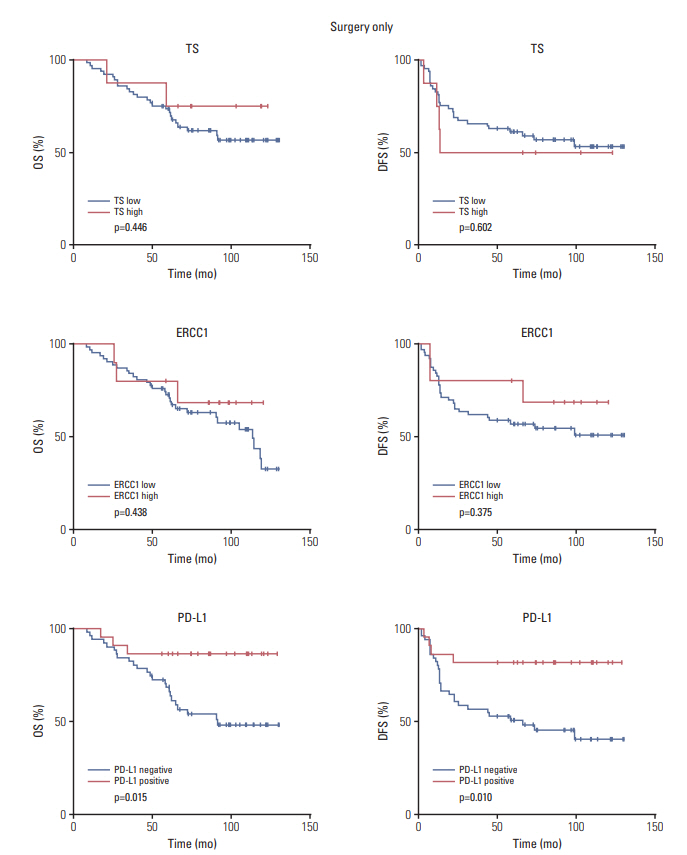Cancer Res Treat.
2019 Apr;51(2):819-831. 10.4143/crt.2018.331.
Immunohistochemistry Biomarkers Predict Survival in Stage II/III Gastric Cancer Patients: From a Prospective Clinical Trial
- Affiliations
-
- 1Division of Medical Oncology, Department of Internal Medicine, Yonsei Cancer Center, Yonsei University College of Medicine, Seoul, Korea. minkjung@yuhs.ac
- 2Department of Pathology, Yanbian University Hospital, Yanji City, China. zhangxianglan@yuhs.ac
- 3Oral Cancer Research Institute, Yonsei University College of Dentistry, Seoul, Korea.
- 4Division of Biostatistics, Department of Biomedical Systems Informatics, Yonsei University College of Medicine, Seoul, Korea.
- 5Song-Dang Institute for Cancer Research, Yonsei University College of Medicine, Seoul, Korea.
- 6Department of Pathology, Yonsei University College of Medicine, Seoul, Korea.
- 7Department of Surgery, Yonsei University College of Medicine, Seoul, Korea.
- KMID: 2464427
- DOI: http://doi.org/10.4143/crt.2018.331
Abstract
- PURPOSE
Identification of biomarkers to predict recurrence risk is essential to improve adjuvant treatment strategies in stage II/III gastric cancer patients. This study evaluated biomarkers for predicting survival after surgical resection.
MATERIALS AND METHODS
This post-hoc analysis evaluated patients from the CLASSIC trial who underwent D2 gastrectomywith orwithout adjuvant chemotherapy (capecitabine plus oxaliplatin) at the Yonsei Cancer Center. Tumor expressions of thymidylate synthase (TS), excision repair cross-complementation group 1 (ERCC1), and programmed death-ligand 1 (PD-L1) were evaluated by immunohistochemical (IHC) staining to determine their predictive values.
RESULTS
Among 139 patients, IHC analysis revealed high tumor expression of TS (n=22, 15.8%), ERCC1 (n=23, 16.5%), and PD-L1 (n=42, 30.2%) in the subset of patients. Among all patients, high TS expression tended to predict poor disease-free survival (DFS; hazard ratio [HR], 1.80; p=0.053), whereas PD-L1 positivity was associated with favorable DFS (HR, 0.33; p=0.001) and overall survival (OS; HR, 0.38; p=0.009) in multivariate Cox analysis. In the subgroup analysis, poor DFS was independently predicted by high TS expression (HR, 2.51; p=0.022) in the adjuvant chemotherapy subgroup (n=66). High PD-L1 expression was associated with favorable DFS (HR, 0.25; p=0.011) and OS (HR, 0.22; p=0.015) only in the surgery-alone subgroup (n=73). The prognostic impact of high ERCC1 expression was not significant in the multivariate Cox analysis.
CONCLUSION
This study shows that high TS expression is a predictive factor for worse outcomes on capecitabine plus oxaliplatin adjuvant chemotherapy, whereas PD-L1 expression is a favorable prognostic factor in locally advanced gastric cancer patients.
Keyword
MeSH Terms
Figure
Reference
-
References
1. Sasako M, Sano T, Yamamoto S, Kurokawa Y, Nashimoto A, Kurita A, et al. D2 lymphadenectomy alone or with para-aortic nodal dissection for gastric cancer. N Engl J Med. 2008; 359:453–62.
Article2. Zhang CD, Shen MY, Zhang JK, Ning FL, Zhou BS, Dai DQ. Prognostic significance of distal subtotal gastrectomy with standard D2 and extended D2 lymphadenectomy for locally advanced gastric cancer. Sci Rep. 2015; 5:17273.
Article3. Lee HK, Yang HK, Kim WH, Lee KU, Choe KJ, Kim JP. Influence of the number of lymph nodes examined on staging of gastric cancer. Br J Surg. 2001; 88:1408–12.
Article4. Cristescu R, Lee J, Nebozhyn M, Kim KM, Ting JC, Wong SS, et al. Molecular analysis of gastric cancer identifies subtypes associated with distinct clinical outcomes. Nat Med. 2015; 21:449–56.
Article5. Cancer Genome Atlas Research Network. Comprehensive molecular characterization of gastric adenocarcinoma. Nature. 2014; 513:202–9.6. Sakuramoto S, Sasako M, Yamaguchi T, Kinoshita T, Fujii M, Nashimoto A, et al. Adjuvant chemotherapy for gastric cancer with S-1, an oral fluoropyrimidine. N Engl J Med. 2007; 357:1810–20.
Article7. Noh SH, Park SR, Yang HK, Chung HC, Chung IJ, Kim SW, et al. Adjuvant capecitabine plus oxaliplatin for gastric cancer after D2 gastrectomy (CLASSIC): 5-year follow-up of an openlabel, randomised phase 3 trial. Lancet Oncol. 2014; 15:1389–96.
Article8. Bang YJ, Kim YW, Yang HK, Chung HC, Park YK, Lee KH, et al. Adjuvant capecitabine and oxaliplatin for gastric cancer after D2 gastrectomy (CLASSIC): a phase 3 open-label, randomised controlled trial. Lancet. 2012; 379:315–21.
Article9. Takezawa K, Okamoto I, Okamoto W, Takeda M, Sakai K, Tsukioka S, et al. Thymidylate synthase as a determinant of pemetrexed sensitivity in non-small cell lung cancer. Br J Cancer. 2011; 104:1594–601.
Article10. Sasako M, Terashima M, Ichikawa W, Ochiai A, Kitada K, Kurahashi I, et al. Impact of the expression of thymidylate synthase and dihydropyrimidine dehydrogenase genes on survival in stage II/III gastric cancer. Gastric Cancer. 2015; 18:538–48.
Article11. Jiang J, Liang X, Zhou X, Huang R, Chu Z, Zhan Q. ERCC1 expression as a prognostic and predictive factor in patients with non-small cell lung cancer: a meta-analysis. Mol Biol Rep. 2012; 39:6933–42.
Article12. Olaussen KA, Dunant A, Fouret P, Brambilla E, Andre F, Haddad V, et al. DNA repair by ERCC1 in non-small-cell lung cancer and cisplatin-based adjuvant chemotherapy. N Engl J Med. 2006; 355:983–91.
Article13. Pardoll DM. The blockade of immune checkpoints in cancer immunotherapy. Nat Rev Cancer. 2012; 12:252–64.
Article14. Muro K, Chung HC, Shankaran V, Geva R, Catenacci D, Gupta S, et al. Pembrolizumab for patients with PD-L1-positive advanced gastric cancer (KEYNOTE-012): a multicentre, openlabel, phase 1b trial. Lancet Oncol. 2016; 17:717–26.
Article15. Gao Q, Wang XY, Qiu SJ, Yamato I, Sho M, Nakajima Y, et al. Overexpression of PD-L1 significantly associates with tumor aggressiveness and postoperative recurrence in human hepatocellular carcinoma. Clin Cancer Res. 2009; 15:971–9.
Article16. Massi D, Brusa D, Merelli B, Ciano M, Audrito V, Serra S, et al. PD-L1 marks a subset of melanomas with a shorter overall survival and distinct genetic and morphological characteristics. Ann Oncol. 2014; 25:2433–42.
Article17. Boger C, Behrens HM, Mathiak M, Kruger S, Kalthoff H, Rocken C. PD-L1 is an independent prognostic predictor in gastric cancer of Western patients. Oncotarget. 2016; 7:24269–83.
Article18. Chang H, Jung WY, Kang Y, Lee H, Kim A, Kim HK, et al. Programmed death-ligand 1 expression in gastric adenocarcinoma is a poor prognostic factor in a high CD8+ tumor infiltrating lymphocytes group. Oncotarget. 2016; 7:80426–34.
Article19. Kwon MJ, Kim KC, Nam ES, Cho SJ, Park HR, Min SK, et al. Programmed death ligand-1 and MET co-expression is a poor prognostic factor in gastric cancers after resection. Oncotarget. 2017; 8:82399–414.
Article20. Wu Y, Cao D, Qu L, Cao X, Jia Z, Zhao T, et al. PD-1 and PDL1 co-expression predicts favorable prognosis in gastric cancer. Oncotarget. 2017; 8:64066–82.
Article21. McCarty KS Jr, Miller LS, Cox EB, Konrath J, McCarty KS Sr. Estrogen receptor analyses. Correlation of biochemical and immunohistochemical methods using monoclonal antireceptor antibodies. Arch Pathol Lab Med. 1985; 109:716–21.22. Hirsch FR, McElhinny A, Stanforth D, Ranger-Moore J, Jansson M, Kulangara K, et al. PD-L1 immunohistochemistry assays for lung cancer: results from phase 1 of the Blueprint PD-L1 IHC assay comparison project. J Thorac Oncol. 2017; 12:208–22.
Article23. Jung KW, Won YJ, Kong HJ, Oh CM, Shin A, Lee JS. Survival of Korean adult cancer patients by stage at diagnosis, 2006-2010: national cancer registry study. Cancer Res Treat. 2013; 45:162–71.
Article24. Bang YJ, Van Cutsem E, Feyereislova A, Chung HC, Shen L, Sawaki A, et al. Trastuzumab in combination with chemotherapy versus chemotherapy alone for treatment of HER2-positive advanced gastric or gastro-oesophageal junction cancer (ToGA): a phase 3, open-label, randomised controlled trial. Lancet. 2010; 376:687–97.
Article25. Wilke H, Muro K, Van Cutsem E, Oh SC, Bodoky G, Shimada Y, et al. Ramucirumab plus paclitaxel versus placebo plus paclitaxel in patients with previously treated advanced gastric or gastro-oesophageal junction adenocarcinoma (RAINBOW): a double-blind, randomised phase 3 trial. Lancet Oncol. 2014; 15:1224–35.
Article26. Ribelles N, Lopez-Siles J, Sanchez A, Gonzalez E, Sanchez MJ, Carabantes F, et al. A carboxylesterase 2 gene polymorphism as predictor of capecitabine on response and time to progression. Curr Drug Metab. 2008; 9:336–43.
Article27. Gurubhagavatula S, Liu G, Park S, Zhou W, Su L, Wain JC, et al. XPD and XRCC1 genetic polymorphisms are prognostic factors in advanced non-small-cell lung cancer patients treated with platinum chemotherapy. J Clin Oncol. 2004; 22:2594–601.
Article28. De Dosso S, Zanellato E, Nucifora M, Boldorini R, Sonzogni A, Biffi R, et al. ERCC1 predicts outcome in patients with gastric cancer treated with adjuvant cisplatin-based chemotherapy. Cancer Chemother Pharmacol. 2013; 72:159–65.
Article29. Wang J, Zhou XQ, Li JY, Cheng JF, Zeng XN, Li X, et al. Prognostic significance of ERCC1 expression in postoperative patients with gastric cancer. Chin J Cancer Res. 2014; 26:323–30.30. Grau JJ, Domingo-Domenech J, Morente V, Pera M, Garcia-Valdecasas JC, Fuster J, et al. Low thymidylate synthase expression in the primary tumor predicts favorable clinical outcome in resected gastric cancer patients treated with adjuvant tegafur. Oncology. 2004; 66:226–33.
Article31. Choi J, Lim H, Nam DK, Kim HS, Cho DY, Yi JW, et al. Expression of thymidylate synthase in gastric cancer patients treated with 5-fluorouracil and doxorubicin-based adjuvant chemotherapy after curative resection. Br J Cancer. 2001; 84:186–92.
Article32. Kang YK, Boku N, Satoh T, Ryu MH, Chao Y, Kato K, et al. Nivolumab in patients with advanced gastric or gastrooesophageal junction cancer refractory to, or intolerant of, at least two previous chemotherapy regimens (ONO-4538-12, ATTRACTION-2): a randomised, double-blind, placebo-controlled, phase 3 trial. Lancet. 2017; 390:2461–71.
Article
- Full Text Links
- Actions
-
Cited
- CITED
-
- Close
- Share
- Similar articles
-
- Single Patient Classifier Assay, Microsatellite Instability, and Epstein-Barr Virus Status Predict Clinical Outcomes in Stage II/III Gastric Cancer: Results from CLASSIC Trial
- Preoperative Chemotherapy in Advanced Stomach Cancer (Pros)
- The Clinical Analysis of Endometrial Cancer by Surgical Staging
- Expression of Survivin and KAI-1 in Gastric Adenocarcinomas
- Immunochemosurgery for Gastric Carcinoma





